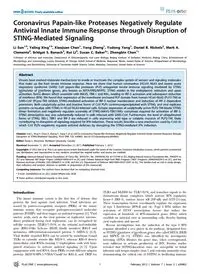
2012 Coronavirus Papain-like Proteases Negatively Regulate Antiviral Innate Immune Response through Disruption of STING- PDF
Preview 2012 Coronavirus Papain-like Proteases Negatively Regulate Antiviral Innate Immune Response through Disruption of STING-
Coronavirus Papain-like Proteases Negatively Regulate Antiviral Innate Immune Response through Disruption of STING-Mediated Signaling Li Sun1., Yaling Xing1., Xiaojuan Chen1, Yang Zheng1, Yudong Yang1, Daniel B. Nichols2, Mark A. Clementz2, Bridget S. Banach2, Kui Li3, Susan C. Baker2*, Zhongbin Chen1* 1 Division of Infection and Immunity, Department of Electromagnetic and Laser Biology, Beijing Institute of Radiation Medicine, Beijing, China, 2 Department of Microbiology and Immunology, Loyola University of Chicago Stritch School of Medicine, Maywood, Illinois, United States of America, 3 Department of Microbiology, Immunology and Biochemistry, University of Tennessee Health Science Center, Memphis, Tennessee, United States of America Abstract Viruses have evolved elaborate mechanisms to evade or inactivate the complex system of sensors and signaling molecules that make up the host innate immune response. Here we show that human coronavirus (HCoV) NL63 and severe acute respiratory syndrome (SARS) CoV papain-like proteases (PLP) antagonize innate immune signaling mediated by STING (stimulator of interferon genes, also known as MITA/ERIS/MYPS). STING resides in the endoplasmic reticulum and upon activation, forms dimers which assemble with MAVS, TBK-1 and IKKe, leading to IRF-3 activation and subsequent induction of interferon (IFN). We found that expression of the membrane anchored PLP domain from human HCoV-NL63 (PLP2-TM) or SARS-CoV (PLpro-TM) inhibits STING-mediated activation of IRF-3 nuclear translocation and induction of IRF-3 dependent promoters. Both catalytically active and inactive forms of CoV PLPs co-immunoprecipitated with STING, and viral replicase proteins co-localize with STING in HCoV-NL63-infected cells. Ectopic expression of catalytically active PLP2-TM blocks STING dimer formation and negatively regulates assembly of STING-MAVS-TBK1/IKKe complexes required for activation of IRF-3. STING dimerization was also substantially reduced in cells infected with SARS-CoV. Furthermore, the level of ubiquitinated forms of STING, RIG-I, TBK1 and IRF-3 are reduced in cells expressing wild type or catalytic mutants of PLP2-TM, likely contributing to disruption of signaling required for IFN induction. These results describe a new mechanism used by CoVs in which CoV PLPs negatively regulate antiviral defenses by disrupting the STING-mediated IFN induction. Citation: Sun L, Xing Y, Chen X, Zheng Y, Yang Y, et al. (2012) Coronavirus Papain-like Proteases Negatively Regulate Antiviral Innate Immune Response through Disruption of STING-Mediated Signaling. PLoS ONE 7(2): e30802. doi:10.1371/journal.pone.0030802 Editor: Karen L. Mossman, McMaster University, Canada Received November 11, 2011; Accepted December 21, 2011; Published February 1, 2012 Copyright: � 2012 Sun et al. This is an open-access article distributed under the terms of the Creative Commons Attribution License, which permits unrestricted use, distribution, and reproduction in any medium, provided the original author and source are credited. Funding: National Natural Science Foundation of China (No. 30972761, No. 30870536, No. 81172799 to ZC), Beijing Natural Science Foundation (No. 7092075 to ZC) and National S&T Major Project (2008ZX10004-015 to ZC) and Chinese National High-Tech R&D Program (‘‘863’’ Program) (2006AA02Z412 to ZC), and the National Institutes of Health, USA (AI060915 to SCB), and the U.S. Department of Defense (W81XWH-09-01-0391 to KL). The funders had no role in study design, data collection and analysis, decision to publish, or preparation of the manuscript. Competing Interests: The authors have declared that no competing interests exist. * E-mail:
